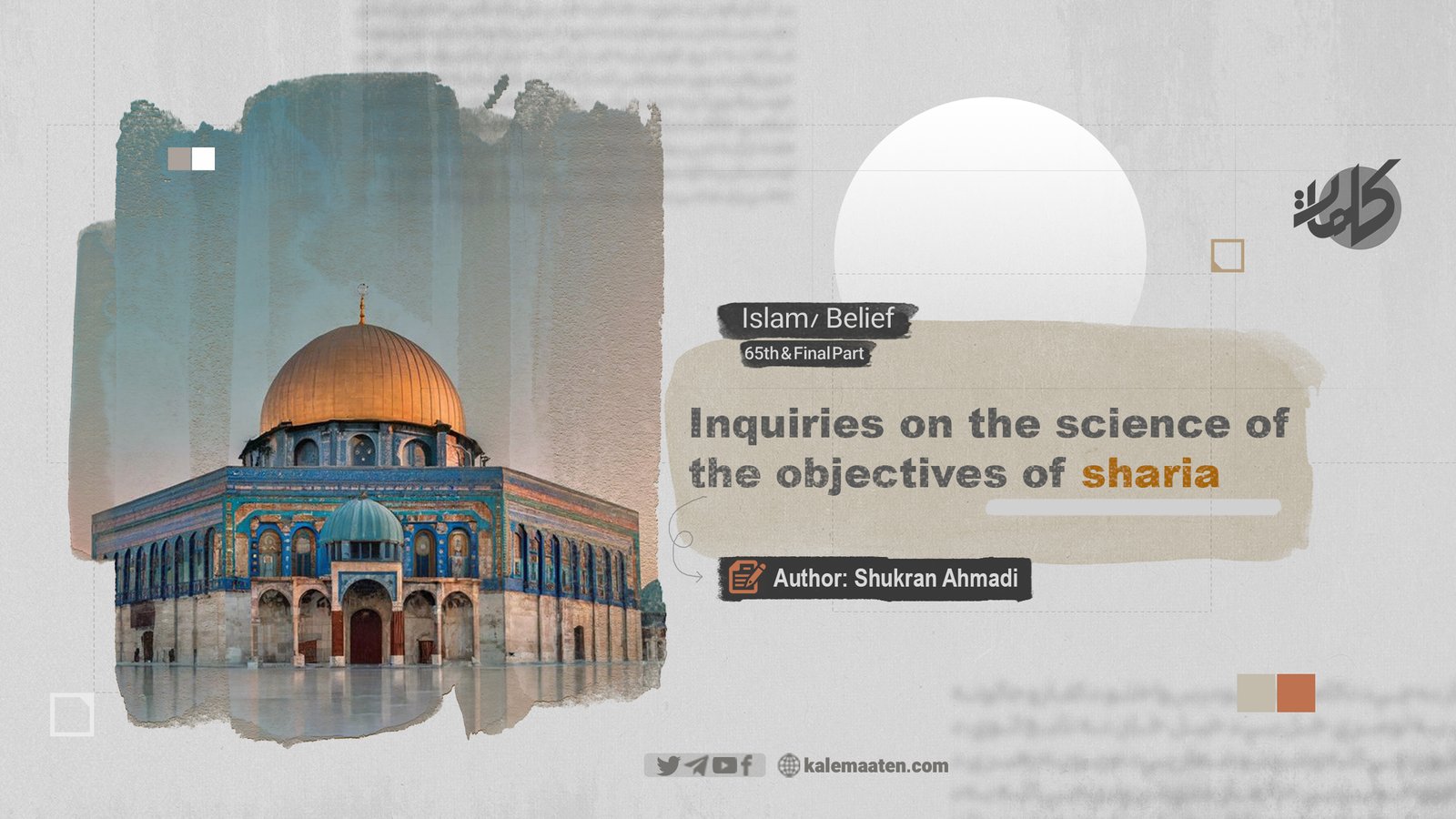Author: Shukran Ahmadi
Inquiries on the Science of the Objectives of Sharia (the 65th and final part)
C: Principles Related to the Objectives of the Mukallaf (Legally Responsible Person)
1.Whenever the goal of the Mukallaf contradicts the purpose of the Lawgiver (Sharia), it is deemed invalid; because religious acts are instituted to bring about benefits and repel harms, and this objective is not fulfilled when opposed.
As al-Ghazali (MABH) says: opposing the objective of the Lawgiver is forbidden. Therefore, seeking nearness to Allah through hardship is not permissible, since righteous deeds are the means of nearness to Allah the Exalted, and hardship in and of itself is not inherently desired.
Sometimes, the reward for a difficult deed is greater, in which case the Mukallaf performs the difficult action with the intention of attaining a greater reward—not for the sake of hardship itself.
2. The Lawgiver has established a path of relief for every difficult and burdensome action, so that one who seeks relief may find it—such as the legal dispensations (rukhaṣ) which serve as alternatives to strict commands (‘azā’im). In either case, the doer follows the command of the Lawgiver.
3. Customary matters (the habits and customs of people) are not considered un-Islamic unless they contradict explicit religious texts. Their validity does not require religious proof, because the default in customary matters is that their benefit is considered valid—unless they contradict religious texts, in which case that benefit is nullified.
Section D: Principles Related to Preferences
1.Necessities (ḍarūriyyāt) are prioritized first, then needs (ḥājiyyāt), and then embellishments (taḥsinyyat).
2.Public interests take precedence over private ones.
3.General (comprehensive) interests are superior to supplementary interests.
4.Repelling harm is prioritized over bringing benefit. When both harm and benefit are present in a matter, preventing the harm takes precedence, as the Lawgiver often seeks to eliminate prohibitions.
5.The objective (maqsad) always takes precedence over the means (wasilah).
6.A more prevalent harm (mufsadah aghlabiyyah) takes precedence over a less prevalent one.
7.A certain (established) harm takes precedence over a probable or disputed harm.
8.Preserving some benefits is better than losing everything.
Important Observation:
What becomes evident through these principles and characteristics is the greatness and magnificence of the Islamic Sharia and its objectives.
Key Points:
•The features of the objectives of Islamic Sharia (Maqasid al-Sharia) are divided into two categories: primary features and secondary features.
•The principles of Maqasid al-Sharia are also divided into two categories: general principles and specific principles.
•The specific principles are further divided into four sections:
1.Principles related to identifying the objectives
2.Principles related to the means to the objectives
3.Principles related to the objectives of the Mukallaf
4.Principles related to preferences
Previous Part
References:
1.The Holy Qur’an
2.Ibn ‘Āshūr al-Tūnisī, Muhammad al-Ṭāhir ibn Muhammad ibn Muhammad al-Ṭāhir (2004), Maqāṣid al-Sharia al-Islāmiyyah, ed. Muhammad al-Ḥabīb ibn al-Khūjah, Ministry of Endowments and Islamic Affairs, Qatar.
3.al-Raysūnī, Aḥmad. (1992), Naẓariyyat al-Maqāṣid ‘inda al-Imām al-Shāṭibī, International Islamic Book House.
4.al-Shāṭibī, IIbrahim ibn Mūsā ibn Muḥammad al-Lakhmī al-Gharnāṭī, al-Muwāfaqāt fī Uṣūl al-Sharia, ed. Abū ‘Ubaydah Mashhūr ibn Ḥasan Āl Salmān, Dār Ibn ‘Affān.
5.al-Qushayrī, Abū al-Ḥusayn Muslim ibn al-Ḥajjāj (al-Naysābūrī) (133 AH), Ṣaḥīḥ Muslim, Dār al-Jīl, Beirut, Lebanon.
6.al-Yūbī, Muḥammad Sa‘d ibn Aḥmad ibn Mas‘ūd, Maqāṣid al-Sharia al-Islāmiyyah wa ‘Alāqatuhā bi al-Adillah al-Shar‘iyyah, Riyadh, Dār al-Hijrah.
7.al-Zarkashī, Badr al-Dīn, Muḥammad ibn Bahādur, al-Baḥr al-Muḥīṭ fī Uṣūl al-Fiqh, Dār al-Kutub al-‘Ilmiyyah, Beirut, Lebanon.
8.al-Ghazali, Abū Ḥāmid, Muḥammad ibn Muḥammad, al-Mustaṣfā fī ‘Ilm al-Uṣūl, Beirut, Mu’assasat al-Risālah.
9.Ibn Qayyim al-Jawziyyah, Muḥammad ibn Abī Bakr, Shifā’ al-‘Alīl fī Masā’il al-Qaḍā’ wa al-Qadar wa al-Ḥikmah wa al-Ta‘līl, Dār al-Ma‘rifah, Beirut, Lebanon.
10.al-Āmidī, Abū al-Ḥasan Sayf al-Dīn, ‘Alī ibn Abī ‘Alī ibn Muḥammad, Ghāyat al-Marām, Supreme Council for Islamic Affairs.
11.Fakhr al-Dīn al-Rāzī, Abū ‘Abd Allāh, Muḥammad ibn ‘Umar al-Rāzī, Mafātīḥ al-Ghayb (al-Tafsīr al-Kabīr), Mu’assasat al-Risālah.
12.Ibn Ḥazm, Abū Muḥammad ‘Alī ibn Ḥazm al-Andalusī al-Ẓāhirī, al-Iḥkām fī Uṣūl al-Aḥkām, Beirut, Dār al-Jīl.
13.Ibn Qayyim al-Jawziyyah, Muḥammad ibn Abī Bakr, Miftāḥ Dār al-Sa‘ādah wa Manshūr Wilāyat al-‘Ilm wa al-Irādah, Cairo, Dār al-Ḥadīth.
14.Muḥammad Muṣṭafā al-Zuḥaylī (2006), al-Wajīz fī Uṣūl al-Fiqh al-Islāmī, Damascus, Dār al-Khayr.
15.Abū Dāwūd, Sulaymān ibn al-Ash‘ath al-Sijistānī, Sunan Abī Dāwūd, Beirut, Lebanon, al-Maktabah al-‘Aṣriyyah, Ṣaydā.
16.al-Najdī, Samī‘, Ahamiyyat al-Maqāṣid al-Shar‘iyyah, Dār al-Kutub al-‘Ilmiyyah, Beirut, Lebanon.
17.Muḥammad ibn Aḥmad, Abū ‘Abd Allāh al-Qurṭubī (1962), Tafsīr al-Qurṭubī, ed. Aḥmad al-Bardūnī and IIbrahim Aṭfīsh, Cairo, Dār al-Kutub al-Miṣriyyah.



